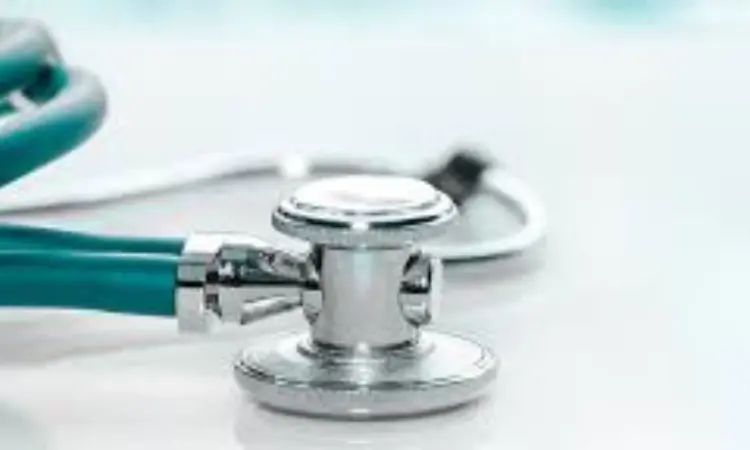- Home
- Medical news & Guidelines
- Anesthesiology
- Cardiology and CTVS
- Critical Care
- Dentistry
- Dermatology
- Diabetes and Endocrinology
- ENT
- Gastroenterology
- Medicine
- Nephrology
- Neurology
- Obstretics-Gynaecology
- Oncology
- Ophthalmology
- Orthopaedics
- Pediatrics-Neonatology
- Psychiatry
- Pulmonology
- Radiology
- Surgery
- Urology
- Laboratory Medicine
- Diet
- Nursing
- Paramedical
- Physiotherapy
- Health news
- Fact Check
- Bone Health Fact Check
- Brain Health Fact Check
- Cancer Related Fact Check
- Child Care Fact Check
- Dental and oral health fact check
- Diabetes and metabolic health fact check
- Diet and Nutrition Fact Check
- Eye and ENT Care Fact Check
- Fitness fact check
- Gut health fact check
- Heart health fact check
- Kidney health fact check
- Medical education fact check
- Men's health fact check
- Respiratory fact check
- Skin and hair care fact check
- Vaccine and Immunization fact check
- Women's health fact check
- AYUSH
- State News
- Andaman and Nicobar Islands
- Andhra Pradesh
- Arunachal Pradesh
- Assam
- Bihar
- Chandigarh
- Chattisgarh
- Dadra and Nagar Haveli
- Daman and Diu
- Delhi
- Goa
- Gujarat
- Haryana
- Himachal Pradesh
- Jammu & Kashmir
- Jharkhand
- Karnataka
- Kerala
- Ladakh
- Lakshadweep
- Madhya Pradesh
- Maharashtra
- Manipur
- Meghalaya
- Mizoram
- Nagaland
- Odisha
- Puducherry
- Punjab
- Rajasthan
- Sikkim
- Tamil Nadu
- Telangana
- Tripura
- Uttar Pradesh
- Uttrakhand
- West Bengal
- Medical Education
- Industry
Inclisiran safely reduces LDL-C in primary prevention patients with elevated levels: Study

Twice-yearly maintenance dosing with inclisiran significantly reduces LDL-C and other atherogenic lipoprotein measurements in patients without established cardiovascular disease (CVD).
USA: Combination therapies are often required to attain targets of LDL cholesterol (LDL-C) for the primary prevention of ASCVD (atherosclerotic cardiovascular disease). A recent study published in European Heart Journal examined the effects of inclisiran in primary prevention patients with increased LDL-C despite statins.
The study found inclisiran, a small interfering ribonucleic acid (siRNA) targeting the production of hepatic proprotein convertase subtilisin/kexin type 9 (PCSK9), to be generally well-tolerated in primary prevention patients with increased LDL-C; the patients derived significant decrease in the levels of atherogenic lipoprotein with twice-yearly maintenance dosing.
Most cardiovascular events occur in patients without a prior atherosclerotic cardiovascular disease (ASCVD) history. Therefore, practical strategies for primary prevention are critical for reducing the global burden of ASCVD. Considering the multi-factorial causes of ASCVD, policies directed at lifestyle and behaviour and individualized approaches to control conventional risk factors such as blood pressure and lipid levels are complementary strategies to promote public health.
Apart from lifestyle and diet, the main pharmacological approach for lowering atherogenic lipoproteins in primary prevention patients is to lower LDL-C with statins. Other lipid-lowering therapies are considered if lowering LDL-C with statins is insufficient for the level of individual risk.
Kausik K Ray, Imperial College London, London, UK, and colleagues conducted a pre-specified analysis of the ORION-11 trial. The study included 203 patients at risk of, but without prior, CV events and LDL-cholesterol ≥2.6 mmol/L, despite maximally tolerated statins. 284 mg inclisiran was administered on days 1, 90, and after that, every six months up to 540 days.
Safety assessment was done over 540 days. The researchers assessed the percentage LDL-C change from baseline to Day 510 and the time-adjusted change from baseline after Day 90 and up to Day 540 (co-primary endpoints). Also, the researchers noted the percentage and absolute changes in atherogenic lipoproteins (key secondary endpoints).
The authors reported the following findings:
- The mean baseline (SD) LDL-cholesterol was 3.6 (1.5) mmol/L.
- The placebo-corrected LDL-C change with inclisiran at Day 510 was −43.7%, with a corresponding time-adjusted change of −41.0%.
- At Day 510, the placebo-corrected absolute change in LDL-C with inclisiran was −1.5 mmol/L, and the time-adjusted change was −1.3 mmol/L.
- Inclisiran remarkably decreased apolipoprotein B (apoB) and non-HDL cholesterol at Day 510 compared to placebo, with a greater probability of attaining the goals of lipoprotein and apoB, and was well-tolerated other than mainly mild, adverse events emerging from treatment at the injection site.
To conclude, the twice-yearly administration of inclisiran (following the initial and 3-month doses) by subcutaneous (SC) injection was generally well-tolerated. It provided an effective and sustained decrease in multiple atherogenic lipoproteins across a wide range of high-risk primary prevention patients with increased LDL-C despite maximally tolerated statins.
Reference:
Kausik K Ray, David Kallend, Lawrence A Leiter, Frederick J Raal, Wolfgang Koenig, Mark J Jaros, Gregory G Schwartz, Ulf Landmesser, Lorena Garcia Conde, R Scott Wright, for the ORION-11 Investigators, Effect of inclisiran on lipids in primary prevention: the ORION-11 trial, European Heart Journal, 2022;, ehac615, https://doi.org/10.1093/eurheartj/ehac615
Dr Kamal Kant Kohli-MBBS, DTCD- a chest specialist with more than 30 years of practice and a flair for writing clinical articles, Dr Kamal Kant Kohli joined Medical Dialogues as a Chief Editor of Medical News. Besides writing articles, as an editor, he proofreads and verifies all the medical content published on Medical Dialogues including those coming from journals, studies,medical conferences,guidelines etc. Email: drkohli@medicaldialogues.in. Contact no. 011-43720751


